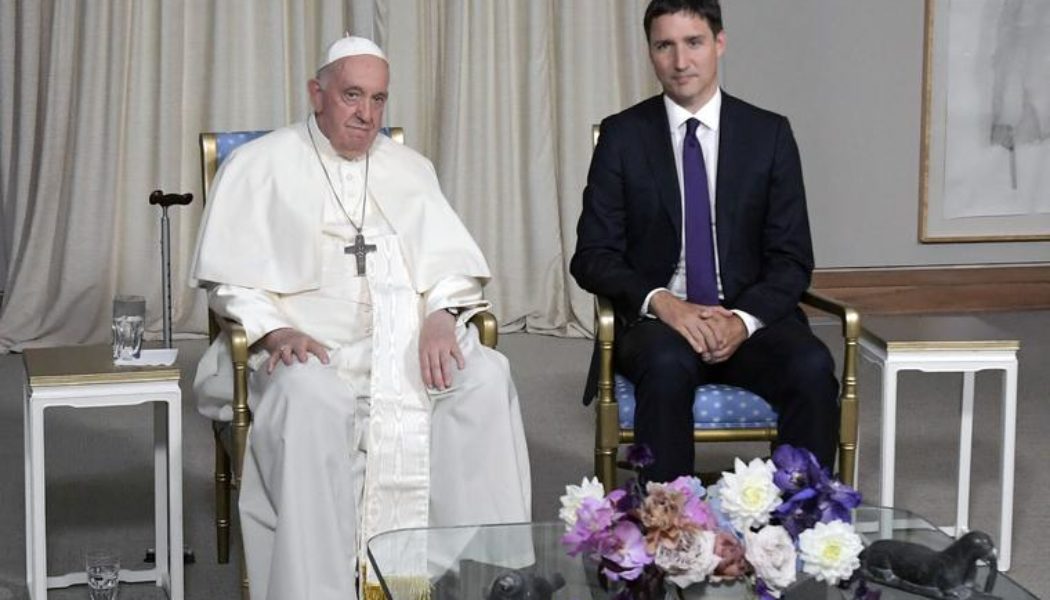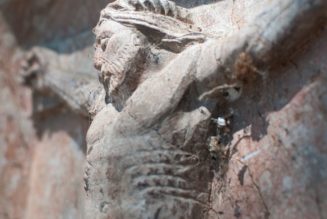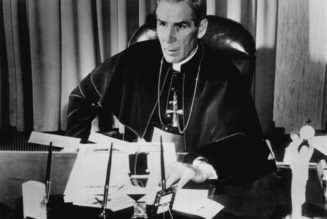
COMMENTARY: The Holy Father said the Church needs to avoid collaborating with state power, which seeks to destroy the ‘natural attachment of peoples to their values.’
To what degree should the Church, in obedience to the mission given to her to make disciples of all nations, cooperate with state power to that end?
As the visit of Pope Francis continues in Canada, with his sincere apology to Indigenous peoples for the Church’s operation of residential schools generally well received, some of the discussion turned to the broader question of the Church’s presence in this hemisphere itself.
A protest banner briefly unfurled at the papal Mass at Ste. Anne de Beaupre on Thursday — “Rescind the Doctrine” — referred to the 15th-century origins of the European presence in the Americas. The Catholic Church left behind what is referred to as the “Doctrine of Discovery” in 1537, and that requires a separate analysis. However, the broader question of the Church’s very presence in the Americas remains.
Some of the discordant notes sounded this week were, at bottom, about that issue. Pope Francis laid down a marker, contrary to the recent posture of the local Churches in Canada, defending the presence of the early missionaries and their contribution to the preservation and enrichment of Indigenous cultures.
On the specific question of residential schools for Indigenous children, the Holy Father also insisted that the critical issue was Church cooperation with state power:
[In] that deplorable system, promoted by the governmental authorities of the time, which separated many children from their families, different local Catholic institutions had a part.
Those Catholic institutions likely thought that they were carrying out the Church’s mission of preaching the Gospel. Yet the cooperation with state power rendered, as Pope Francis said, the “overall effects … catastrophic.”
The Holy Father then linked the “colonizing mentality” of the past with new forms of “ideological colonization” — a practice that both the Trudeau government in Canada and the Biden administration in the United States are leading exponents. Pope Francis addressed these words to Prime Minister Justin Trudeau:
In the past, the colonialist mentality disregarded the concrete life of people and imposed certain predetermined cultural models; yet today too, there are any number of forms of ideological colonization that clash with the reality of life, stifle the natural attachment of peoples to their values, and attempt to uproot their traditions, history and religious ties. This mentality, presumptuously thinking that the dark pages of history have been left behind, becomes open to the “cancel culture” that would judge the past purely on the basis of certain contemporary categories.
The Church has to be careful today, too, in collaborating with state power that seeks to destroy the “natural attachment of peoples to their values.” That can be the case, for example, in endorsing ecological and climate change initiatives that see poor people as a problem to be eliminated.
Who might Pope Francis have had in mind when he spoke about “cancel culture”?
In Canada, the first prime minister, Sir John A. Macdonald, has been “canceled” in some prominent places for his government’s role in creating the residential school system. But it is far more likely that the Holy Father had in mind St. Junípero Serra, whom he canonized in 2015 on his trip to Washington.
Soon after his election as pope, Francis decided to highlight the work of key Catholic missionaries whose causes for canonization had stalled. Employing a unilateral exercise of papal authority, he decided to canonize Jose de Anchieta of Brazil and Junipero Serra of California, Spanish Jesuit and Franciscan missionaries, respectively, as well as Joseph Vaz, the Goan missionary in Sri Lanka. In addition, he included two blesseds of 17th-century Quebec, François-Xavier de Laval and Marie de l’Incarnation.
Pope Francis lifted up the example of St. François when addressing the Canadian bishops on Thursday before venerating his tomb at Notre Dame cathedral in Quebec City. St. François, like his namesake St. Francis Xavier, arrived in the mission lands as part of a colonial expansion, the former under the French crown, the latter under the Portuguese.
St. François though was able to criticize those same colonial authorities when they gave counterwitness to the Gospel, particularly in regard to Indigenous peoples.
“Let us recover the missionary zeal of your first bishop, Saint François de Laval, who railed against those who demeaned the indigenous people by inducing them to imbibe strong drink in order then to cheat them,” Pope Francis reminded his listeners.
There were some Catholic voices who objected to the state project of residential schools, but they were a small minority. Too few had the courage and wisdom of St. François. Most Catholic institutions went along with the government policy and now, so many years later, a bitter harvest is still being reaped.
The option of evangelization alongside state power is not available today as it was in the Americas several centuries ago. The Church, for her part at Vatican II and in St. John Paul II’s encyclical on mission, Redemptoris Missio, committed herself to propose in freedom, not impose by state power, the Gospel. Yet that prior entanglement, and now disentanglement, includes painful episodes in history.
That is the deeper background to what is unfolding in Canada this week, and why the papal visit is of interest throughout the Americas and beyond.
Join Our Telegram Group : Salvation & Prosperity









